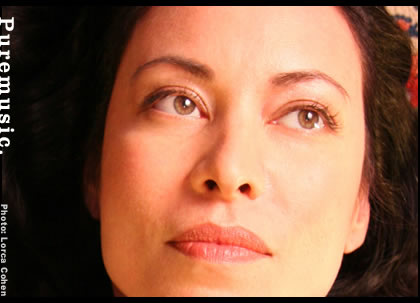
A Conversation with
Anjani
(continued)
PM: Is it fair to say that your two previous records were more openly spiritual releases?
ANJANI: The second one called The Sacred Names, definitely.
PM: That was a beautiful record.
ANJANI: The first one was just kind of a record of where I was at that moment in time. It's funny, as I listen to it now, it doesn't even sound like me.
PM: I listened to some tracks today, and I felt the same way. It's like, "Wow, that's a much different person."
ANJANI: It's a completely different person. The metamorphosis kind of astounds me, as a matter of fact. And that was just in like a seven year separation. But we went through a lot.
PM: Yeah, seven years is a long time.
ANJANI: A person can change.
PM: Yeah.
[laughter]
PM: Most don't, but some of us can.
ANJANI: Right, right.
PM: But even though this isn't spiritual in any overt way, you're obviously a person to whom those matters are important.
ANJANI: Yeah, I think I was always on a spiritual search for some kind of inner awakening. And I went through the usual bitter realization that it really wasn't going to happen.
PM: Wow, that's so interesting that you put it that way.
ANJANI: I just didn't want to be happy, I wanted enlightenment. I wanted bliss and the joy that they talk about in the books.
PM: Right.
ANJANI: I wanted the whole shebang. And I wanted it from a young age. I had started meditating when I was 15 years old, doing yoga, and I was a vegetarian. I kind of went whole hog. And the longer I tried, the further it got away from me. Then you get disheartened, and that turns into frustration. Then a complete having to come to terms with this kind of uncomfortable realization that maybe you've been searching for something your whole life that was never really something you were going to get.
PM: Yeah.
ANJANI: And I don't know, I went through a kind of--like I say, a sort of bitter traumatic time with it. And interestingly enough, Leonard was going through a similar understanding about the same time.
PM: Wow.
ANJANI: And I think that's...kind of funny. We met each other, and our lives just kind of went through these sort of parallel spiritual epiphanies of going to the mountain, and then leaving the mountain, and going through depression, and having the veil of it lift at about the same time with both of us, and both coming back to L.A. at the same time, and starting to work together again.
So it's true that that was always the basis for my life, I suppose you could say. At some point, fortunately, I think because I left it, or because I felt I was forced to leave it because it just wasn't working for me and I got so disheartened by the whole thing, when I left it there was a kind of new freedom that worked its way into my life. And eventually I kind of came around to it again, in a way that isn't about an overt search. I'm not looking for anything. It's just more that a quality of spirituality has become engrained in the life.
PM: Yeah, I think maybe we get to a point where instead of looking for what we lack, we work with what we have--
ANJANI: Right. And the practice of life is your spiritual walk.
PM: Right.
ANJANI: So everything you do in it, whether it's playing some notes on the piano or singing or writing, or working on a beautiful website--which you have--I love the design of your website--
PM: Oh, thank you so much.
ANJANI: To me it's more about creating beauty and keeping your word and being a person of honor and having some integrity, and just trying to operate in this world with your head above water while not pissing everybody off.
PM: [laughs]
ANJANI: It seems to me that's the mark of a spiritual person.
PM: Thank you for all that. continue
print (pdf) listen to clips puremusic home